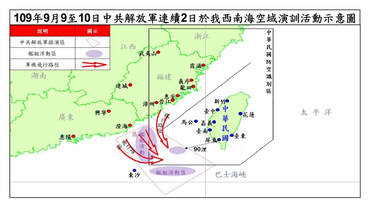 Taiwan Ministry of National Defense figure illustrating PLA incursions into Taiwan's southwestern ADIZ on September 9-10, 2020.
Taiwan Ministry of National Defense figure illustrating PLA incursions into Taiwan's southwestern ADIZ on September 9-10, 2020. The drums of war are growing louder in the Taiwan Strait. In the last month, at least 50 People’s Liberation Army (PLA) aircraft have entered Taiwan’s airspace. The volume of threatening language directed at Taiwan from sources in China, both official and unofficial, has reached a crescendo, and the headlines in the news grow more alarmingeach month. In the United States, mainstream foreign policy voices are now openly debating whether the U.S. should abandon strategic ambiguity and openly commit to defend Taiwan in the case of an attack — an idea advocated not so long ago by only a radical fringe.
But these dire headlines are misleading: Beijing is not gearing up for an attack on Taiwan. It still has neither the capacity to launch a successful full-scale invasion, nor the motive to risk a conflict with the United States. In reality, the increasingly bellicose language coming from China is a sign of weakness, not strength, and a cover for the failure of its own Taiwan policy. Having thrown away most of its non-military leverage in a fruitless effort to compel Taiwan President Tsai Ing-wen to endorse its one China principle, Beijing has now been reduced to counter-productive saber-rattling to express its discontent at U.S. arms sales and high-level diplomatic visits, while Taiwan races to strengthen its own defenses and reorient its economy away from overdependence on mainland China. In short, Xi Jinping’s approach to the “Taiwan issue” has turned into a strategic fiasco — one that may take years for Beijing to recover from...
 RSS Feed
RSS Feed
